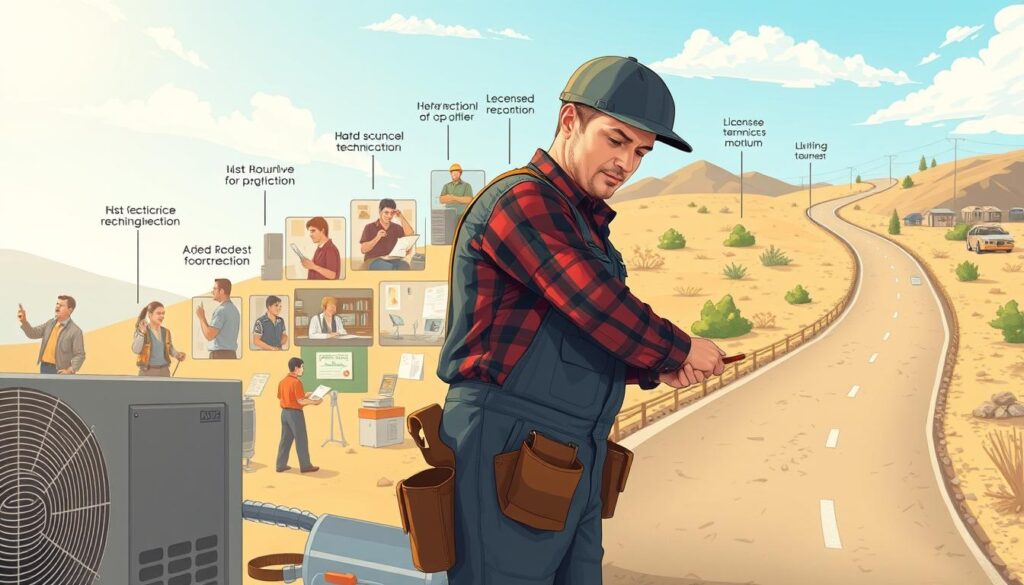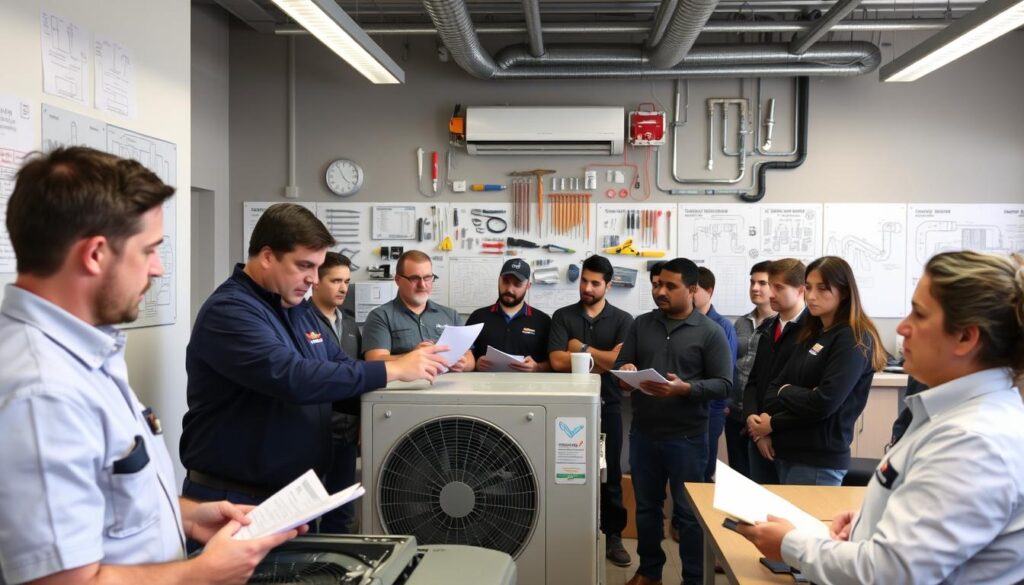Affiliate Disclosure
HVAC Guide Guys is a participant in the Amazon Services LLC Associates Program, an affiliate advertising program designed to provide a means for sites to earn advertising fees by advertising and linking to Amazon.
How Long Does It Take to be a Journeyman HVAC Tech? Ever wondered how quickly you could start a new career in HVAC? Becoming a journeyman HVAC technician might be faster and more exciting than you think.

Exploring how long it takes to become a journeyman HVAC tech, you’ll find several paths. Full-time training programs can be finished in just 11 months. This gives you quick access to this fast-paced technical field.
The time for HVAC training depends on your chosen path. Certificate programs last from six to 12 months. Associate degrees take two years. Each option has its own benefits for future technicians.
The U.S. Bureau of Labor Statistics predicts a 5 percent growth in HVAC technician jobs over the next decade. This means lots of career chances in this vital industry.
Key Takeaways
- HVAC training can be completed in as little as 11 months
- Multiple educational paths exist for aspiring technicians
- Certificate programs offer faster entry into the field
- Job market shows positive growth projections
- Flexible learning options accommodate different schedules
Table of Contents
Understanding the HVAC Career Path
Starting an HVAC career is exciting and fulfilling. It involves planning, training, and learning complex skills. The time it takes to become an HVAC technician varies, usually between 2 to 5 years.
Basic Requirements and Prerequisites
To begin your HVAC career, you need to meet some basic requirements:
- High school diploma or equivalent
- Basic math and reading skills
- Physical fitness for technical work
- Strong problem-solving skills
Education vs. Apprenticeship Routes
There are two main ways to become an HVAC professional: through education or apprenticeship. Both paths include classroom learning and practical experience.
| Education Route | Apprenticeship Route |
|---|---|
| 1-2 years technical school | 3-5 years on-the-job training |
| Structured classroom learning | Direct mentorship from experienced technicians |
| Faster initial certification | Earn while you learn |
Industry Certification Overview
Certifications are key to growing in your HVAC career. Important ones include:
- EPA Refrigerant Handling Certification
- NATE (North American Technician Excellence) Certification
- State-specific HVAC licenses
Each certification requires specific training hours. They show your skill in working with complex HVAC systems.
The Journey from Apprentice to Journeyman HVAC Technician
Becoming a journeyman HVAC technician is a journey that needs dedication and skills. It starts as an apprentice, where you learn by doing. You’ll get practical knowledge in heating, ventilation, air conditioning, and refrigeration.
The path to becoming a journeyman involves several stages:
- Initial apprenticeship training
- Supervised work experience
- Technical skill acquisition
- Professional certification
To become a journeyman, you must complete a certain number of work hours. Most states require 4-6 years of training. You’ll learn important skills like installing systems, doing maintenance, electrical work, and troubleshooting.
As you progress, you’ll move from being supervised to working on your own. Your experience and skills will show if you can handle complex HVAC system challenges on your own.
Important steps in your journey include:
- Finishing classroom and practical training
- Gaining verified work experience hours
- Passing professional certification exams
- Getting state-specific licenses
Successful HVAC technicians keep learning and improving their skills. Your dedication to growing professionally will shape your success in this rewarding field.
HVAC Technical School Training Duration
Starting your HVAC journey at a technical school requires planning and dedication. You’ll dive into the world of skilled trades education. This is the first step towards becoming an HVAC technician.
Technical schools offer different paths for those interested in HVAC. Your choice depends on your career goals. You can pick from several training options:
- Certificate programs: 6-12 months duration
- Associate degree programs: Approximately 2 years
- Comprehensive HVAC technician programs: 18-24 months
Core Curriculum Components
Your education will mix theory and practice. You’ll learn about:
- Heating system technologies
- Refrigeration principles
- Electrical systems
- Air conditioning fundamentals
- HVAC system design and installation
Hands-on Training Requirements
Practical experience is key in HVAC training. About 50% of technical courses involve laboratory work. This ensures you get real-world skills. Programs include:
- Practical workshops
- Equipment maintenance simulations
- Installation practice sessions
- Diagnostic skill development
Certification Preparation Time
Getting ready for professional certifications is part of your training. Most programs set aside time for exam prep. This helps you become a certified HVAC technician.
The Bureau of Labor Statistics predicts a 5% job growth for HVAC technicians between 2020 and 2030. This makes now a great time to start your technical education.
Required Work Experience Hours for Journeyman Status
To become a journeyman in HVAC, you need a lot of experience and a clear career plan. You must work under licensed pros for many hours to become a pro HVAC tech.
Every state has its own rules for getting journeyman certification. Here are some common ones:
- Minimum of 4,000 to 8,000 work hours
- Supervised experience under licensed contractors
- Documented practical training in various HVAC specialties
But, the rules can change from state to state. For example:
- Alabama: Requires 3,000 hours (18 months) of work experience
- California: Mandates 4 years of experience within the previous 10 years
- Arizona: Demands 4 years of specialty experience or 2 years plus educational certification
Getting journeyman status takes time and effort. You need to keep track of your work hours, finish required training, and meet state rules. Working as an apprentice can help you gain experience faster.
Successful HVAC technicians view each work hour as an opportunity to build expertise and advance their careers.
How Long Does It Take to be a Journeyman HVAC
Becoming a journeyman HVAC technician is a journey that takes time and dedication. The time it takes varies by state, but it usually takes 2 to 5 years. This includes both training and gaining experience.
State-by-State Timeline Variations
The time you spend in HVAC training can change based on your location. Here are some key differences:
- Apprenticeship lengths range from 2 to 5 years
- States have different requirements for work experience hours
- Licensing rules also vary by region
Average Completion Timeframes
Most HVAC professionals follow a set path to become a journeyman:
- Certificate Programs: 6-12 months
- Associate Degree: Up to 2 years
- Apprenticeship: 4-5 years
Factors Affecting Duration
Several things can affect how long it takes to become a journeyman HVAC technician:
“Your path depends on your education, training, and local licensing rules.”
- Your educational background
- Whether you train full-time or part-time
- How much practical experience you gain
- Passing state-specific certification exams
The Bureau of Labor Statistics predicts a 5% job growth for HVAC technicians in the next decade. This makes it a great career choice for those willing to invest in thorough training.
Explore Our HVAC Shop
Looking for top-rated HVAC tools, parts, and accessories? Visit our shop and find the perfect solution for your needs.
Visit the ShopEssential Skills and Knowledge Development

For success in HVAC, you need to develop a wide range of skills. As an aspiring HVAC technician, you’ll learn more than just mechanical knowledge. You’ll also master technical and interpersonal skills.
Your education in HVAC skilled trades will cover key areas:
- Technical System Understanding
- Gas heating systems
- Electric heating technologies
- Heat pump operations
- Residential and commercial refrigeration
- Electrical Competencies
- Electrical circuit analysis
- Computerized control systems
- Diagnostic troubleshooting techniques
Safety is a top priority in HVAC professional development. You’ll learn about safety protocols. This includes how to handle refrigerants, electrical safety, and using personal protective equipment.
| Skill Category | Key Competencies | Importance Level |
|---|---|---|
| Technical Knowledge | System Design | High |
| Diagnostic Skills | Equipment Troubleshooting | Critical |
| Customer Interaction | Communication | Essential |
“Continuous learning is the hallmark of a successful HVAC professional.” – Industry Expert
Your HVAC education will focus on problem-solving and adapting to new tech. You’ll learn to work well in different settings. Staying updated with skills keeps you ahead in this fast-changing field.
Explore Our HVAC Shop
Looking for top-rated HVAC tools, parts, and accessories? Visit our shop and find the perfect solution for your needs.
Visit the ShopState Licensing Requirements and Timeframes
Getting your HVAC certification involves knowing the licensing rules in each state. To become a journeyman HVAC technician, you must follow important state rules. These rules make sure you’re skilled and safe on the job.
When you’re working towards becoming a journeyman HVAC technician, you’ll face several important steps. These steps are key to getting your professional certification:
- Minimum age requirement typically set at 18 years old
- Completion of approved HVAC education programs
- Specific work experience hours
- Passing thorough trade exams
Examination Process
Getting certified means passing tough tests. These tests check if you know your stuff and have the right skills. Most states have two main tests:
- Trade Examination: 80 questions in 4 hours
- Business and Law Examination: 50 questions in 2 hours
Documentation Requirements
Gathering your documents is a big part of the certification process. You’ll need to collect:
- Proof of finished education hours
- Verified work experience papers
- Proof of liability insurance (usually $500,000 per event)
- Professional references
Renewal Periods
Keeping your HVAC license up to date is important. Most states make you renew every 2-3 years. Renewal usually means:
- Pay a renewal fee
- Get continuing education credits
- Show you’re keeping up with your skills
Knowing these rules helps you smoothly get through your HVAC certification journey.
Explore Our HVAC Shop
Looking for top-rated HVAC tools, parts, and accessories? Visit our shop and find the perfect solution for your needs.
Visit the ShopExplore Our HVAC Shop
Looking for top-rated HVAC tools, parts, and accessories? Visit our shop and find the perfect solution for your needs.
Visit the ShopHVAC Apprenticeship Program Structure

HVAC apprenticeship programs are a great way for future technicians to learn. They mix practical training with classroom learning. This creates a strong base for new professionals.
These programs last from 3 to 4 years. They dive deep into heating, ventilation, and air conditioning systems. Apprentices learn a lot through hands-on training and classroom lessons.
- On-the-job training typically spans 1-2 years
- Classroom instruction covers technical knowledge
- Supervised work experience under licensed professionals
- Gradual progression of technical skills and responsibilities
Right now, over 63,846 HVAC apprentices work in the U.S. They start with a salary between $26,000 to $43,000. The average hourly rate is $16.38.
“An apprenticeship is not just a job, but a complete learning experience. It prepares you for a successful HVAC career.” – Industry Expert
| Program Component | Duration | Key Focus |
|---|---|---|
| Practical Training | 1-2 years | Hands-on technical skills |
| Classroom Instruction | 2-3 years | Theoretical knowledge |
| Certification Preparation | Ongoing | EPA 608 and industry certifications |
To start, most programs need a high school diploma or GED. This ensures apprentices have a good educational base. Some states also require registration with a state licensing board. This shows how serious and professional these training programs are.
Career Advancement Opportunities After Journeyman Status
Getting to journeyman status in HVAC is just the start. The HVAC world has many ways to grow your career and increase your earnings. With the HVAC job market expected to grow 13 percent by 2028, there are lots of chances for those who are eager to move up.
Your career can take many exciting paths:
- Specialized Certifications
- EPA Certification (Type I, II, III, or Universal)
- NATE Certification in specific equipment types
- HVAC Excellence Certifications
- Management Roles
- HVAC Team Supervisor
- Project Manager
- Operations Coordinator
- Advanced Technical Positions
- HVAC Systems Designer
- Technical Instructor
- Energy Efficiency Consultant
Many dream of starting their own HVAC business. With over 10 years of experience, you can take the leap. Experienced technicians make about $32.83 an hour, and owning a business can boost your earnings even more.
The green movement is opening up new areas in sustainable HVAC. By keeping up with new skills and specializing, you can stand out. This ensures your career will keep growing and you’ll stay financially secure.
Explore Our HVAC Shop
Looking for top-rated HVAC tools, parts, and accessories? Visit our shop and find the perfect solution for your needs.
Visit the ShopIndustry Certifications and Continuing Education
Getting into the HVAC field means planning your certifications carefully. Your career growth depends on getting the right certifications. These show you’re skilled and open up more job chances.
Getting certified in HVAC involves several key steps. These steps can really boost your job prospects:
- EPA Section 608 Certification
- NATE (North American Technician Excellence) Certification
- HVAC Excellence Professional Certification
- OSHA Safety Certification
Each certification is a big step forward in your career. The EPA Section 608 Certification, for example, is needed for working with refrigerants. It shows you’re tech-savvy.
“Continuous learning is the minimum requirement for success in the HVAC industry.” – Industry Professional
Keeping up with new tech is key in HVAC. It keeps you competitive and job-ready.
| Certification | Average Cost | Typical Duration |
|---|---|---|
| EPA Section 608 | $50-$150 | 1-2 Days |
| NATE Certification | $100-$260 | 3-6 Months Prep |
| HVAC Excellence | $75-$200 | 2-4 Weeks |
Investing in your HVAC education through certifications is smart. It sets you up for success in this fast-changing field.
Salary Progression During the Journey
As you work towards becoming an HVAC journeyman, knowing how your salary will grow is key. Starting as an HVAC technician, you’ll earn about $22.47 an hour. This amount can increase as you gain more experience and skills.
Apprentice wages show a clear path to earning more. At first, you’ll make around $22 an hour, or $45,760 a year. As you learn more, your pay will go up. After 2-4 years, you could earn $30.53 an hour, a 20-30% increase.
After 6-9 years, your earnings really take off. You might make about $27.65 an hour, or $57,512 a year. In big cities like San Francisco or New York, you could start at $62,000 a year. Experienced technicians can earn up to $32.83 an hour by the 10-year mark.
Where you work also affects how much you can earn. Places like California, New Jersey, and Washington pay more, from $55,900 to $57,000. But, states like Mississippi and West Virginia pay less, around $48,100. Knowing these differences can help you plan your career and earn more.

